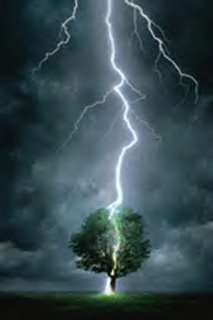
[First posted May 21, 2006]
"Thy thunder, conscious of the new command,
Rumbles reluctant o'er our fallen house."
— John Keats, Hyperion
"Awakening from the dream . . . " — we say that a lot around here, in fact a lot of people have said it for a long time in a lot of ways.
It looks good on paper, but what does is mean? How does one awaken?
We know what being awake is like, so what's the big deal? Or do we just think we know?
Think of the few times — the very few, most likely — when you were so aware of the moment that time was no longer apparent or important and there was no longer any moment. Perhaps you were so happy that the emotion carried you over and beyond some edge without warning at light speed like a roller coaster. The emotion then stopped, but you did not. You were beyond "deliriously happy" or "immeasurably sad" or "scared shitless." You had arrived to a place of all peace and no time. The fact that you can recall these "moments" tells you that you were very aware of being conscious at those particular points of your life.
Each moment that you allow your self to recall these particular points of aware consciousness melts away as these points of reality pour like golden liquid into your present presence. When we're very old and can't or don't want to move much around anymore, we will be able to conjure these golden moments up with expertise, able to live in them more and more. Anyone looking at us will probably think we're not fully "there" anymore. They'd be right, for we'd be fully "here."
What about all the stretches of time between those particular points — can you recall them? Probably not, because you were not very aware of being conscious then — you were "under conscious," or beneath the surface of awakedness. It's darker beneath the surface, there's less light, like having your eyes closed all the time, while watching the projections on your inner eyelids and believing you're seeing reality.
A suggestion: even when we open our eyes, we're still projecting on our inner screens, with the belief that what we're seeing is outside and real.
Many like to think they're on some kind of "path" throughout their life. However, those lit-up points of aware consciousness that you can access now, with all their colours, sounds, smells and textures — are like separate stepping stones -- not a continuous path — with varying lengths of distance between them.
Try this. It will only serve those who have had the experience usually known as "lucid dreaming" — where one's body is sleeping and the consciousness is still traveling — it never stops traveling — but one becomes aware of the consciousness's journey, simultaneously aware that one is not in the body but "must be dreaming." During lucid dream experiences, one is awake — more awake than when one is awake in the body, for the body is a dense filter with special responses and chemicals to dampen most of our awareness. This filter is also known as the ego-mind, or as the Risen say, "the simulate self." There is the experience of hyper-reality in a lucid dream — every thing is "more real" — every thing is experienced as alive. Colours are glowing, sounds are vibrating, the jaw drops from the sheer texture of life in this "dream." One is no longer alone as a living thing, but completely immersed in a sharing with all living things.
There is a tendency to emphasize lucid dreams from the point of one's discovery that one can "control" one's environment in the dream. This may be so, but it's not important, for play is play for its own sake. It's when the lucid dreamer stops trying to control, ceases to struggle, that there arises a very surprising feeling of
oh-my-god-this-is-real! juxtaposed with the feeling of
oh-my-god-this-can't-be-real!. It is beyond "awe," a sensation which implies fear on some level.
A word for this feeling might be "glee" — a word of ancient Indo-European roots (Sanskrit) — ghel-
2 — referring to any colour with a golden shine. This golden light of every colour fills one with amazement and wonder, or "astonishment." "Astonish" carries evidence of incredibly ancient "vocal" origins, meaning a word that arose from pure throat sounds, the kinds of sounds that are caused by emotion, not thought, and perhaps best reflected in our modern word "thunder," which also has the same roots as "glee." Although the modern word "thunder" doesn't sound like thunder, think of the feelings and emotions that arise when you are surprised, without warning, by one of those thunderclaps that shakes the teeth, raises the hair and causes primal pants-wetting. And yet some of us like - nay,
love —this kind of storm, for it makes us laugh in maniacal glee, and we live and wait for the next one.
Do it again!! Why? It makes us
feel alive. A real eye-opener, a wake-me-upper.
This is the same feeling that arises, like an unbidden thunderclap, when one wakes up in a dream, while the dream country still remains all around.
The is the same kind of feeling that must be bidden in order to wake up in this terrestrial dream world, which will also still remain all around.
Why wait?
When this is experienced in enough of certain ways, one will be led to make the next and previously hidden connection, and that is, now that one is lucid in
this dream, can one change it?



